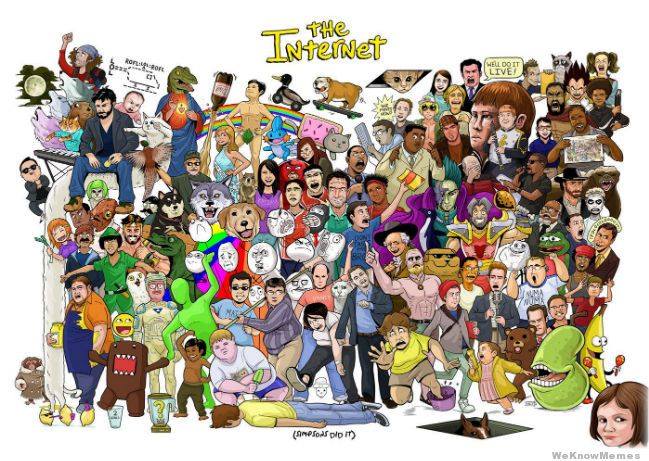Memes have changed multiple definitions and emerged in the past few years as a sort of unique universal internet language that connects the youth from across the world
on many different levels. Memes (derived from the Greek word ‘Mimeme’ which means ‘to imitate’) can be defined as a picture, a video, a piece of text that is typically humourous and is rapidly spread across the internet through copying and sharing on social media platforms of individuals.
Memes are seen to range from topics that are niche, which only a certain group of people understand or can be completely in the mainstream. Over the years, there have been memes about including but not limited to student lives, adult struggles, specific study streams, feel-good topics, music, relationships, politics, dark, offensive subjects, cartoon characters. Even memes about memes. But as a phenomenon, it shows no signs of letting up anytime soon, covering almost every inch of your facebook, instagram feeds. It’s clear that memes are emerging as a way for people to simply connect to one another using humour as a medium.
Memes revolving around mental health and related disorders have only started gaining popularity in the past 2 years. Memes which involve humour and talk about ailments like depression, anxiety, bipolar syndrome, OCD, etc have been massively shared by the younger population. There is a lot of debate on whether it’s appropriate to mix humour and serious mental illnesses, especially in an unmonitored social media setting.
The possible positive effects can be argued. It creates a sense of relatability among mental health patients having a similar diagnosis. Some teenagers suffering from chronic depression and Anxiety disorder have mentioned that sharing a funny meme about their illness allows them to talk about their problems freely in front of their friends since it’s technically being said by “someone else”. It can contribute a lot to reducing the stigma around their illness and make conversations a little more comfortable. It also, in a way, keeps the patient’s’ social circle aware of the problems they go through every day leading to them being more empathetic towards their condition.
In addition to this, humour has been linked to improve psychiatric conditions in many cases. The benefits of humour in therapy and group therapy have been demonstrated in the past And healthy conversations sparked through this humour can help patients better cope with their illness.
Though the effect of humour can be beneficial in therapy, it does not necessarily mean the same on social media without the supervision of a trained psychologist. Similarly it’s argued that reblogging a certain meme or post is an easy task but actually driving meaningful conversation through them is not.
It can often lead to a sense of superficial happiness and momentary validation depending on the number of reblogs, likes, and comments. It also gives individuals a sense of relief that others understand and go through something similar. This illusion can be shattered by the minutest of negative reactions and can worsen the situation.
Another dangerous effect of the amount of mental health memes is that due to the massive number of people sharing these posts, the individuals that actually suffer from these illnesses may feel like it is okay to have the problem since everybody around them seems to be struggling with the same difficulties and due to this misconception, will deny the need for psychological help.There are plenty of resources available online and offline for those actually suffering which would end up being completely ignored by those in need.
Another interesting take on the same is the effect of these memes on the younger population who is just now joining social media sites. They are greeted by the overwhelming amount of socially inappropriate memes being shared by their older siblings, friends, etc normalizing illnesses and disorders. This not only over-normalizes illnesses but also, in a way, romanticizes them and leads to a sort of grim contest about who seems to be the most depressed, anxious and uninterested. The kind of content and memes people post on their social media could also lead to a better understanding of what the person is going through, not just to psychologists and psychiatrists but also their close friends and family and aid them to get help soon.
There is not much research conducted on this specific topic since it’s a relatively new branch in social media. But considering everything, it’s best for everyone to individually assess how memes are affecting your outlook on not just mental health, but life in general.
So go ahead and share that meme, tag your friends but make sure to check if it could be something more deeply rooted than just sardonic humour.
Authorship: ‘Memes and Mental Health’ is compiled by Meera Jakkli for Synapsium Brain Health Clinic, Mumbai. Shraddha Shah founded Synapsium Brain Health Clinic in 2013 where a team of psychologists provide various psychological and neuropsychological services. Shraddha is a clinical psychologist specializing in neuropsychology. She is currently serving as a private consultant at Jaslok Hospital & Research Center and Sir H.N. Reliance Foundation Hospital. She is also a visiting faculty member at S.N.D.T. University.

